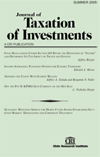Attaining Capital Gains Treatment in a Related-Party Condominium Conversion Sale
Author: Michael F. Lynch, J.D., C.P.A..; Nicholas C. Lynch, Ph.D..
Source: Volume 27, Number 03, Spring 2010 , pp.79-92(14)

< previous article |return to table of contents
Abstract:
If the owner of an apartment complex decides to sell the entire unit, the gain on the sale of the investment property would normally be treated as a long-term capital gain under Code Section 12311 and be taxed at 15 percent (after applying the 25 percent rate for any “unrecaptured Section 1250 gain,” i.e., the gain that would have been depreciation recapture if Section 1250 applied the same rules for real property that apply for depreciable personal property). On the other hand, if the owner of the building is in the business of selling real estate in the ordinary course of business, then each individual sale of real estate would be taxed as ordinary income at a rate as high as 35 percent. But what would be the tax consequences of converting an apartment building into individual condominium units and then offering each unit for sale separately? Would the seller get capital gains treatment because investment property that has been held for many years is now being disposed of in pieces? Or would the seller now be deemed a dealer in real estate and be subject to the ordinary income rates? In general, a real estate dealer is an individual who is engaged in the business of selling real estate to customers with a view to the profits that may be derived from such sales. On the other hand, an individual who merely holds real estate for investment or speculation purposes and receives rentals is not considered a real estate dealer.Keywords:
Affiliations:
1: Director of Graduate Tax Studies, Bryant University; 2: Georgia Southern University.